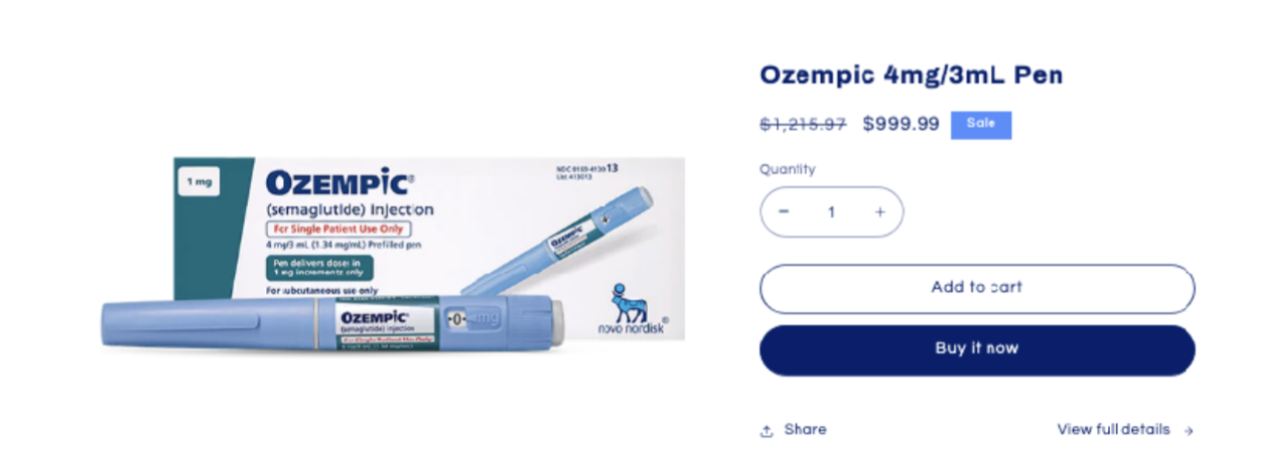The FDA has approved drugs like Ozempic, Wegovy, and Rybelus for those suffering from obesity, diabetes, and other weight-related illnesses. Since their approval, these drugs have faced worldwide popularity - resulting in supply shortages.These shortages have caused healthcare merchants to offer alternative products containing semaglutide, the active pharmaceutical ingredient in Ozempic, Wegovy, and Rybelsus. Read more for details about these drugs are why some semaglutide products are considered problematic.
What is Semaglutide?
In June 2021, the FDA approved Wegovy (semaglutide) for weight management in overweight or obese adults with co-occurring health issues. Since then, drugs containing semaglutide have risen in popularity across celebrity circles and on social media as an easy way to quickly lose weight. Due to its apparent effectiveness, semaglutide demand has rapidly outpaced supply, leading some unscrupulous e-commerce merchants to market products without prescription requirements and others to ensnare consumers through non-delivery scams.
Semaglutide (often sold under brand names such as Wegovy, Ozempic, and Rybelsus) was initially introduced in 2017 to manage type 2 diabetes. It works by imitating GLP-1, a naturally occurring hormone, signaling the stomach to empty more slowly.
Semaglutide inhibits glycogenolysis and gluconeogenesis, two processes that increase blood sugar during digestion. As a side effect, semaglutide also decreases hunger and food cravings. Semaglutide medications are taken once daily (or via weekly subcutaneous injections). The most common side effects include but are not limited to digestive issues such as nausea, vomiting, diarrhea, and constipation.
In extreme cases, patients can become dehydrated, need prescription anti-nausea medication, or even need to be hospitalized. It’s essential that a doctor oversees the use of this medication in order to reduce the occurrence of more harmful side effects.
Semaglutide has become extremely popular for weight loss, and despite its high price tag (often fetching $890 to $1,300 for a monthly supply), it’s in short supply worldwide. Some US patients have resorted to ordering from international pharmacies to obtain the medication, most often buying from Canada or Mexico (see the image below).
LegitScript has observed a growing trend of merchants offering semaglutide to US consumers without requiring a prescription, which poses an elevated risk for regulatory and card brand scrutiny.

This Gap In Availability Has Also Led To The Rise Of Consumer Scams
This past March, Australia’s Therapeutic Good Administration (TGA) warned citizens about online scams related to semaglutide. Australian officials were seeing advertisements that marketed semaglutide-containing drugs for prescription online to be shipped directly to consumers’ doorsteps.
The TGA stated, “In some cases, consumers who pay for products online fail to receive any product, while in other cases the product received is not semaglutide. Even for those individuals who receive semaglutide, it may not be medically suitable for them.“
LegitScript Flags Problematic and/or Illegal Drugs For Sale Online
LegitScript has flagged several merchant accounts found to be selling unapproved drugs containing semaglutide, often marketed as research chemicals. Among the most concerning were merchants selling unmarked bottles of white powder (see image below).
Similar to weight-gain products such as Apetamin, these products are likely being marketed via social media accounts. LegitScript continues to keep an eye out for potential transaction laundering using generically named products, a tactic commonly used for illicit sales of Melanotan II, a tanning product. LegitScript will continue to monitor merchants for offering semaglutide and report risk accordingly.




